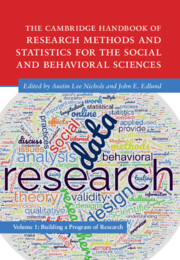 The Cambridge Handbook of Research Methods and Statistics for the Social and Behavioral Sciences
The Cambridge Handbook of Research Methods and Statistics for the Social and Behavioral Sciences from Part I - From Idea to Reality: The Basics of Research
Published online by Cambridge University Press: 25 May 2023
A literature review is a survey of scholarly sources that establishes familiarity with and an understanding of current research in a particular field. It includes a critical analysis of the relationship among different works, seeking a synthesis and an explanation of gaps, while relating findings to the project at hand. It also serves as a foundational aspect of a well-grounded thesis or dissertation, reveals gaps in a specific field, and establishes credibility and need for those applying for a grant. The enormous amount of textual information necessitates the development of tools to help researchers effectively and efficiently process huge amounts of data and quickly search, classify, and assess their relevance. This chapter presents an assessable guide to writing a comprehensive review of literature. It begins with a discussion of the purpose of the literature review and then presents steps to conduct an organized, relevant review.
To save this book to your Kindle, first ensure no-reply@cambridge.org is added to your Approved Personal Document E-mail List under your Personal Document Settings on the Manage Your Content and Devices page of your Amazon account. Then enter the ‘name’ part of your Kindle email address below. Find out more about saving to your Kindle.
Note you can select to save to either the @free.kindle.com or @kindle.com variations. ‘@free.kindle.com’ emails are free but can only be saved to your device when it is connected to wi-fi. ‘@kindle.com’ emails can be delivered even when you are not connected to wi-fi, but note that service fees apply.
Find out more about the Kindle Personal Document Service.
To save content items to your account, please confirm that you agree to abide by our usage policies. If this is the first time you use this feature, you will be asked to authorise Cambridge Core to connect with your account. Find out more about saving content to Dropbox.
To save content items to your account, please confirm that you agree to abide by our usage policies. If this is the first time you use this feature, you will be asked to authorise Cambridge Core to connect with your account. Find out more about saving content to Google Drive.